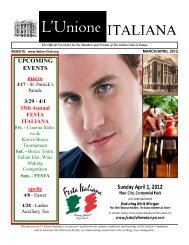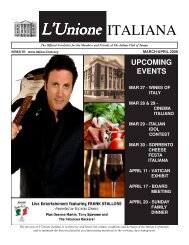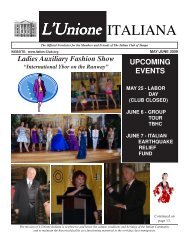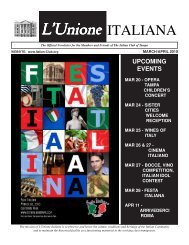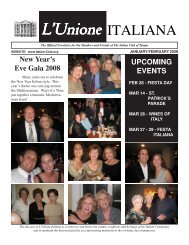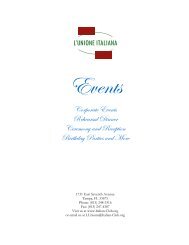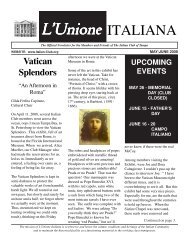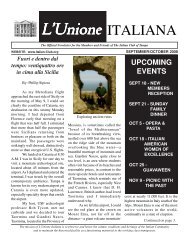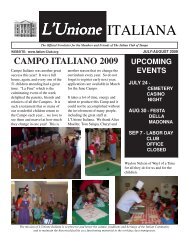VISIT US ON-LINE AT - The Italian Club of Tampa
VISIT US ON-LINE AT - The Italian Club of Tampa
VISIT US ON-LINE AT - The Italian Club of Tampa
Create successful ePaper yourself
Turn your PDF publications into a flip-book with our unique Google optimized e-Paper software.
JULY/AUG<strong>US</strong>T 2004<br />
“<strong>The</strong> Master<br />
Cookbook”<br />
Submitted by John Iorio<br />
At fifteen, I worked with notable<br />
apathy in a restaurant in Belmar,<br />
New Jersey. <strong>The</strong> chef, Giovanni,<br />
joyless from birth, reminded us<br />
that cooking was a quest for the<br />
absolute. “Read Platina on taste,”<br />
he would shout. “Read Platina on<br />
the nature <strong>of</strong> foods. Read<br />
Platina....” I had no idea who<br />
Platina was. <strong>The</strong> 16-hour day<br />
prevented my going to the library;<br />
the eleven dollars a week ruled out<br />
book buying. Decades later, I<br />
realized that Giovanni had not<br />
been mispronouncing Plato.<br />
Platina was a real person who lived<br />
500 years ago.<br />
<strong>The</strong> Renaissance, mother <strong>of</strong> many<br />
visions, beginnings and attitudes<br />
that we now claim as our own, had<br />
a habit <strong>of</strong> categorizing all human<br />
activity into major and minor arts<br />
or, to calm Giovanni, fine and<br />
useful arts. Cooking became a<br />
useful art. Post-Columbian<br />
imports, such as the potato and<br />
tomato from the New World and<br />
spices from the East, rose cooking<br />
to where it had never been. Yet, a<br />
few centuries earlier, priests<br />
berated peasants for seasoning<br />
their boiled pasta with salt and<br />
pepper. Self-flagellation must have<br />
followed when peasants began to<br />
use tomatoes on their ziti.<br />
<strong>The</strong> Romans under the Republic<br />
had a very simple diet – bread,<br />
honey, olives, and cheese for<br />
breakfast; grains and vegetables<br />
and fruit for dinner and always<br />
wine, <strong>of</strong>ten diluted. Only the rich<br />
were able to reach for the meat and<br />
fish. Later, under the Empire,<br />
excess reigned, giving us the<br />
eating and drinking scenes that are<br />
now a staple <strong>of</strong> Hollywood Roman<br />
films. Some historians have even<br />
seen the Roman kitchen as another<br />
reason for the fall <strong>of</strong> Rome. <strong>The</strong><br />
wealthy had gone to pot – the lead<br />
pot. <strong>The</strong> lead poisoning lowered<br />
the birthrate and health <strong>of</strong> the<br />
upper classes so that they were<br />
unable to supply leadership during<br />
the late stages <strong>of</strong> the Empire.<br />
Moral: stay poor.<br />
Not until the Renaissance did<br />
cooking emerge as an art, and<br />
Bartolomeo Sacchi penned the first<br />
cookbook in 1474. Better known<br />
as Platina, a Latin version <strong>of</strong> his<br />
birthplace, Piadena, near Cremona,<br />
his book, De Honesta Voluptate et<br />
Valetudine (Of Worthy Indulgence<br />
and Health), became for centuries<br />
the final arbiter <strong>of</strong> culinary<br />
disputes. <strong>The</strong> title was especially<br />
apt for a time <strong>of</strong> corruption and a<br />
weakening <strong>of</strong> church doctrine – a<br />
time <strong>of</strong> skepticism. Once heaven<br />
was shorn <strong>of</strong> its rewards and hell<br />
<strong>of</strong> its terrors, humans were free to<br />
pursue pleasures <strong>of</strong> the world. As<br />
Platina said, “What evil can there<br />
be in well-considered indulgence”<br />
Platina, who studied science and<br />
Greek culture, rose high in Vatican<br />
circles and before going into the<br />
kitchen, had written an acclaimed<br />
History <strong>of</strong> the Popes. However,<br />
Popes and power change and to be<br />
out <strong>of</strong> favor was a euphemism for<br />
PAGE 14<br />
jail time. Platina’s view <strong>of</strong> Pope<br />
Paul II as an ogre <strong>of</strong> vanity and<br />
greed did not help his resume. For<br />
almost a decade, Platina was in<br />
favor and out <strong>of</strong> favor, in prison<br />
and out <strong>of</strong> prison. <strong>The</strong> kitchen<br />
seemed a good career move.<br />
Platina’s cookbook gives not only<br />
recipes but also advice on related<br />
matters like sex and exercise (both<br />
in moderation, he says). It is also a<br />
guide to foods. His book rests on<br />
two important Renaissance beliefs<br />
– the science <strong>of</strong> humors and<br />
ancient Greek moderation.<br />
An ancient theory has it that the<br />
body is governed by four humors<br />
allied with the four elements:<br />
Blood (air), choler (fire), phlegm<br />
(water), and black bile (earth). <strong>The</strong><br />
humors gave <strong>of</strong>f vapors that<br />
ascended to the brain. An<br />
imbalance among them (bad<br />
humor) would make a person<br />
sanguine, choleric, phlegmatic or<br />
melancholy. Agita, for example,<br />
indicates bad humor. A committee<br />
meeting with everyone having<br />
agita would make for a bad<br />
afternoon. A balance <strong>of</strong> the humors<br />
was called “good humor.” Platina,<br />
in an old variation <strong>of</strong> you are what<br />
you eat, argued that food could<br />
regulate the humors.<br />
Steeped in Greek culture, Platina<br />
also believed in moderation and<br />
proportion in all things. While his<br />
major meal included three courses,<br />
the portions are modest, beginning<br />
with vegetables, followed by meat<br />
and completed with fruit and<br />
cheese. And <strong>of</strong> course, always<br />
Continue on page 15.



